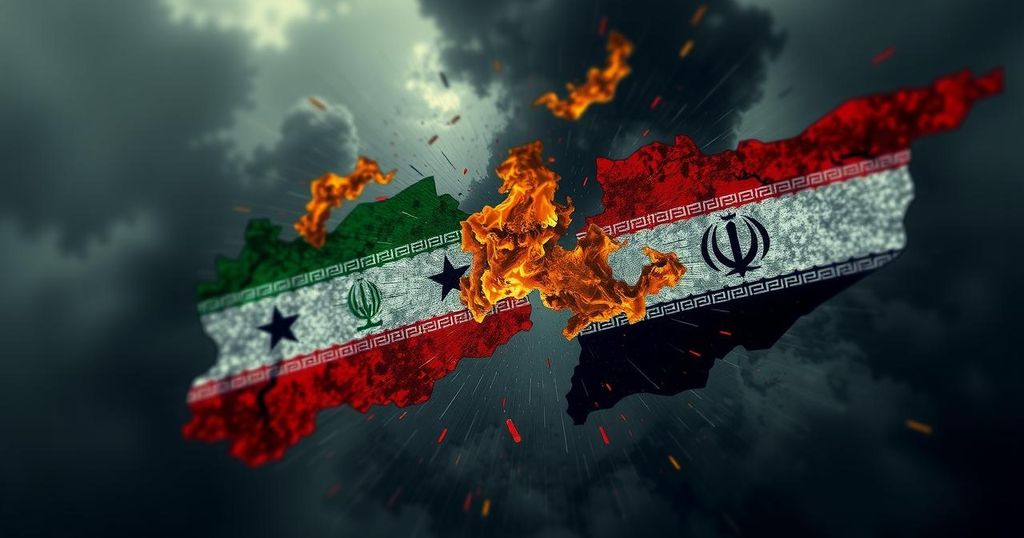Global news
AFRICA, ASIA, BASHA, BUSINESS INSIDER, CENTER FOR PEACE, DIPLOMACY, GEOPOLITICS, HALL, HUDSON INSTITUTE, HUDSON INSTITUTE ' S CENTER FOR PEACE AND SECURITY IN THE MIDDLE EAST, LIBYA, MEDITERRANEAN SEA, MIDDLE EAST PROGRAM, MILITARY, MOROCCO, NATASHA HALL, RIBO, RIBOUA, SAHEL, SYRIA, SYRIAN CONFLICT, TARTUS
Jamal Walker
0 Comments
The Strategic Significance of the Syrian Conflict for Russia and Iran
The Syrian conflict is critical for Russia and Iran due to strategic military interests, with Russia relying on its bases for Mediterranean access and Iran dependent on Syria for logistical support to its proxies, especially Hezbollah. The recent rebel advancements in Aleppo challenge the stability of these alliances and compel both nations to reevaluate their strategies in the increasingly complex civil war.
The Syrian conflict is of paramount importance to both Russia and Iran due to strategic military and political interests. Russia, having established significant military bases in Syria, views the country as a critical gateway to the Mediterranean, enhancing its regional influence and supporting operations across Africa. Iran, on the other hand, relies on Syria for logistical support to its proxy network, particularly its long-standing alliance with Hezbollah in Lebanon. The recent offensive by Syrian rebels, particularly the Islamist group Hayat Tahrir al-Sham, which has made significant territorial gains, poses a serious threat to these alliances and forces both nations to reassess their positions in the ongoing civil war.
Historically, Russia and Syria have shared a close relationship dating back to the Cold War, with Moscow supplying arms and military support to Damascus. This relationship deepened under President Vladimir Putin, who directly intervened in the civil war in 2015 to bolster President Bashar Assad’s regime. With two crucial military installations in Syria—the Hmeimim airbase and the Tartus naval base—Russia maintains its strategic foothold, crucial for its Mediterranean operations and broader geopolitical ambitions. The loss of Syria to rebel forces would significantly undermine these goals.
In parallel, Iran’s connection to Syria is pivotal for maintaining its influence in the region and supporting its proxies, notably Hezbollah. Iran has invested heavily in Syria by establishing military bases and logistical routes that facilitate the transfer of weapons and resources to its allies. As tensions escalate with Israel, which has been actively targeting Iranian positions, Tehran’s involvement in the Syrian conflict becomes increasingly vital to restore its standing and operational capabilities.
The recent developments in Aleppo, where Syrian rebels have made notable advancements, signal a potential shift in the balance of power within the region. This situation not only weakens the Assad regime but also raises concerns for both Russia and Iran regarding their long-term strategies and political influence. National security advisor Jake Sullivan emphasized that, given the distractions faced by Russia, Iran, and Hezbollah due to conflicts elsewhere, the rebels’ offensive comes as little surprise.
As both Russia and Iran refocus their attention on Syria amidst these challenges, the implications of a rebel victory could lead to a significant recalibration of regional dynamics, further complicating their efforts to maintain control over their interests in the area. It is crucial for these nations to mitigate the loss of influence following the recent conflict developments in Syria.
The Syrian civil war began in 2011, stemming from discontent with President Bashar Assad’s regime. Over the years, it has escalated into a multifaceted conflict involving various domestic and international actors. Since the onset of the war, Russia and Iran have emerged as key supporters of Assad’s government, motivated by military, political, and economic interests. Russia’s military footprint includes critical bases, while Iran’s strategic position relies on maintaining a land corridor to support Hezbollah. Understanding the complexities of their involvement is essential for comprehending the regional implications of ongoing battles, such as the recent push by Syrian rebels to seize control of Aleppo and other key territories.
In conclusion, the Syrian conflict continues to be a focal point for both Russia and Iran, acting as a staging ground for their military ambitions and regional strategies. The loss of strategic footholds in Syria could render them vulnerable both regionally and globally, particularly as they face distractions from other conflicts. The ongoing dynamics of the civil war will notably impact their alliances and influence in the Middle East, highlighting the need for careful navigation of their military and political goals amidst an increasingly volatile landscape.
Original Source: www.businessinsider.com




Post Comment